Swiss focus foreign trade on WTO

The World Trade Organization (WTO) and its international regulations are still of fundamental importance to Switzerland, according to the foreign ministry.
Despite various ups and downs last year – not least the collapse of the Doha Round of world trade talks – Switzerland will continue to focus its trade policy on the WTO, the ministry said on Wednesday.
In a statement it said the cabinet did not want to put the various WTO accomplishments on the line.
The foreign ministry added that an agreement on the Doha talks would only ever be possible if Switzerland’s trade partners were also willing to make concessions.
It also said that Switzerland was still looking to negotiate an area of free trade that would include the trafficking of goods, trade competition and the protection of intellectual property in addition to investment, the trade of services and public purchasing.
Of special interest would be the so-called BRIC countries: Brazil, Russia, India and China.
As Economics Minister Doris Leuthard said earlier this week when presenting her department’s annual targets, these regions were expected to gain entry in the near future to the world’s most important economic markets – and were therefore of increasing importance to Swiss exports.
Switzerland is currently negotiating free trade accords with Canada, Thailand and the cooperation council for the Arab Gulf States among others.
Collapse
The Doha Round of world trade talks collapsed in July after the breakdown of negotiations in Geneva between the six leading members of the WTO.
Analysts said the last-ditch talks between the European Union, the United States, Japan, Brazil, Australia and India failed due to the intransigence of Washington and Brussels to give ground on agriculture.
Switzerland, which has a strong farmers lobby, has always rejected WTO calls to lower farm subsidies and import tariffs on agricultural products, but has pushed for liberalisation of services and lower tariffs for industry.
Hope
On Wednesday it was also announced that US Trade Representative Susan Schwab would meet the head of the WTO, Pascal Lamy, in Geneva on Friday in a further effort to revive the Doha talks.
Both Schwab and Peter Mandelson, the EU trade commissioner, said after a meeting on Monday with President Bush and EU Commission President José Manuel Barroso that progress had been made in resolving differences.
The negotiations face a deadline of July 1 when Bush loses his authority to strike agreements that receive expedited treatment in the US Congress.
swissinfo with agencies
The Doha Round of global trade talks began in 2001. The 149 members of the WTO have been negotiating on the liberalisation of trade of goods and services.
Switzerland presides over the G10, a group of nine countries that are leading net importers of agricultural products. The members include South Korea, Japan, Norway, Iceland, Israel and Taiwan.
Switzerland has rejected WTO calls to lower farm subsidies and import tariffs on agricultural products, while pushing for liberalisation of services and lower tariffs for industry.
Free trade is an international trade system which is based on reducing the barriers to the free circulation of goods and services.
Switzerland has followed this policy for a while. In 1960 it joined the European Free Trade Association (Efta).
Most Efta countries have left to join the EU, but Switzerland has not become a member, preferring to conclude bilateral accords with the EU.
Efta (which also includes Liechtenstein, Norway and Iceland) has also concluded free trade agreements with non-European countries such as Singapore, Israel and Chile.
Recent Swiss negotiations with the US on free trade have however stalled.

In compliance with the JTI standards
More: SWI swissinfo.ch certified by the Journalism Trust Initiative











You can find an overview of ongoing debates with our journalists here . Please join us!
If you want to start a conversation about a topic raised in this article or want to report factual errors, email us at english@swissinfo.ch.